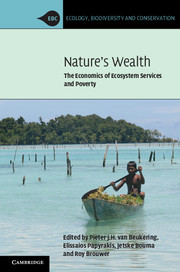Book contents
- Frontmatter
- Contents
- List of contributors
- Acknowledgements
- 1 The economics of ecosystem services and poverty
- Part I Biodiversity-related ecosystem services
- Part II Marine-related ecosystem services
- Part III Forest-related ecosystem services
- Part IV Water-related ecosystem services
- Part V Land-related ecosystem services
- Index
Part II - Marine-related ecosystem services
Published online by Cambridge University Press: 05 July 2013
- Frontmatter
- Contents
- List of contributors
- Acknowledgements
- 1 The economics of ecosystem services and poverty
- Part I Biodiversity-related ecosystem services
- Part II Marine-related ecosystem services
- Part III Forest-related ecosystem services
- Part IV Water-related ecosystem services
- Part V Land-related ecosystem services
- Index
Summary
Marine-related ecosystem services
Coastal regions are special in many ways. First, coastal ecosystems are among the most productive systems in the world. These ecosystems produce disproportionately more services relating to human well-being than most other systems (MEA 2005). Second, 60% of the world’s population lives in coastal zones. The total number of people living in coastal areas has doubled in the last 20 years (Goudarzi 2006). Coastal regions are home for more than 250 million poor people around the world (Brown et al. 2008). Therefore, coastal and marine resources are of increasing importance for human well-being in various ways (e.g. food, employment). Third, coastal ecosystems experience the heaviest impacts from human uses and environmental changes (Adger et al. 2005, Donner and Potere, 2007, Jackson et al. 2001). Future pressures from climate change, population increases in coastal areas, pollution, aquaculture development, greater human mobility and the spread of invasive species are likely to further exacerbate these trends (Brown et al. 2008). As a result, these characteristics of coastal ecosystems pose crucial challenges for the maintenance of ecosystem services and poverty alleviation.
- Type
- Chapter
- Information
- Nature's WealthThe Economics of Ecosystem Services and Poverty, pp. 107 - 114Publisher: Cambridge University PressPrint publication year: 2013



